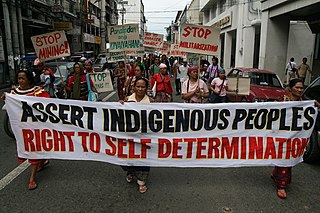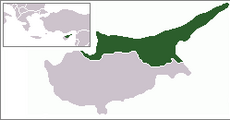The Republic of Cyprus is a unitary presidential representative republic, whereby the President of Cyprus is both head of state and head of government. Executive power is exercised by the government. Legislative power is vested in both the government and the parliament. The Judiciary is independent of the executive and the legislature.

The right of a people to self-determination is a cardinal principle in modern international law, binding, as such, on the United Nations as authoritative interpretation of the Charter's norms. It states that peoples, based on respect for the principle of equal rights and fair equality of opportunity, have the right to freely choose their sovereignty and international political status with no interference.
Territorial integrity is the principle under international law that prohibits states from the use of force against the "territorial integrity or political independence" of another state. It is enshrined in Article 2(4) of the UN Charter and has been recognized as customary international law. Conversely it states that imposition by force of a border change is an act of aggression. It is a political term, for example when applied to a nation-state like Iraq, which has borders which were imposed at the end of WWI.

The Turkish invasion of Cyprus was launched on 20 July 1974, following the Cypriot coup d'état on 15 July 1974.

The Politics of Northern Cyprus takes place in a framework of a semi-presidential representative democratic republic, whereby the president is head of state and the prime minister is the head of government, and of a multi-party system. Executive power is exercised by the government. Legislative power is vested in both the government and the Assembly of the Republic. The judiciary is independent of the executive and the legislature.

United Nations Security Council resolution 1244, adopted on 10 June 1999, after recalling resolutions 1160 (1998), 1199 (1998), 1203 (1998) and 1239 (1999), authorised an international civil and military presence in the Federal Republic of Yugoslavia and established the United Nations Interim Administration Mission in Kosovo (UNMIK). It followed an agreement by Yugoslav President Slobodan Milošević to terms proposed by President of Finland Martti Ahtisaari and former Prime Minister of Russia Viktor Chernomyrdin on 8 June, involving withdrawal of all Yugoslav state forces from Kosovo.

The London and Zürich Agreements for the constitution of Cyprus started with an agreement on the 19 February 1959 in Lancaster House, London, between Turkey, Greece, the United Kingdom and Cypriot community leaders. On that basis, a constitution was drafted and agreed together with two prior Treaties of Alliance and Guarantee in Zürich on 11 February 1959.
The political status of Kosovo, also known as the Kosovo question, is the subject of a long-running political and territorial dispute between the Serbian government and the Government of Kosovo, stemming from the breakup of Yugoslavia (1991–92) and the ensuing Kosovo War (1998–99). In 1999 the administration of the province was handed on an interim basis to the United Nations under the terms of UNSCR 1244 which ended the Kosovo conflict of that year. That resolution reaffirmed the territorial integrity of Serbia over Kosovo but required the UN administration to promote the establishment of 'substantial autonomy and self-government' for Kosovo pending a 'final settlement' for negotiation between the parties.
United Nations Security Council Resolution 355, adopted on 1 August 1974, recalled its resolutions 186, 353 and 354, noted that all States have declared their respect for Cyprus' sovereignty, independence and territorial integrity and requested the Secretary-General take appropriate action with regard to a possible cease-fire and report back to the Council. The resolution was looking to implement an end to the conflict sparked by the Turkish invasion of Cyprus.
United Nations Security Council Resolution 360, adopted on 16 August 1974, after recalling previous resolutions and noting that all states have declared their respect for the sovereignty, independence and territorial integrity of the Republic of Cyprus, the Resolution formally records its disapproval of the unilateral military actions taken against it by Turkey. The Council then urged the parties to comply without delay to their previous resolutions, particularly 353, and then requested the Secretary-General to report back to them as necessary with a view to possibly adopting further measures designed to promote the restoration of peaceful conditions.

United Nations Security Council Resolution 367, adopted on 12 March 1975, after receiving a complaint from the Government of the Republic of Cyprus, the Council again called upon all States to respect the sovereignty, independence, territorial integrity and non-alignment of the Republic of Cyprus.
The sixth emergency special session of the United Nations General Assembly was held between 10–14 January 1980 to consider the situation in Afghanistan. As the Soviet–Afghan War began members of the United Nations General Assembly requested the Security Council consider the situation. The USSR veto of a resolution led the other members to invoke the 'Uniting for Peace' resolution to defer the issue to the General Assembly in an emergency special session. It was the sixth emergency special session since the 'Uniting for Peace' resolution was adopted in 1950. The session was dominated by questions of its legitimacy since the Afghanistan government had invited the Soviet intervention in their civil war. Led by the non-aligned members, the session ended with a resolution from the General Assembly calling for the immediate, unconditional and total withdrawal of foreign troops from Afghanistan and the cessation of all outside intervention, subversion, coercion or constraint, of any kind whatsoever, so that its people could freely choose its own economic, political and social systems.

United Nations Security Council resolution 716, adopted unanimously on 11 October 1991, after noting a report of the Secretary-General, the Council recognised the progress made regarding the "Set of Ideas" in Cyprus and reaffirmed the efforts of the United Nations in solving the Cyprus dispute.

United Nations Security Council resolution 774, adopted unanimously on 26 August 1992, after reaffirming all previous resolutions on Cyprus, the Council noted that while some progress had been made in negotiations between the two communities on Cyprus, there had still been some difficulties in fully implementing Resolution 750 (1992).

United Nations Security Council resolution 1062, adopted unanimously on 28 June 1996, after recalling all resolutions on Cyprus, particularly resolutions 186 (1964), 939 (1994) and 1032 (1995), the Council expressed concern at the lack of progress in the political dispute in Cyprus and extended the mandate of the United Nations Peacekeeping Force in Cyprus (UNFICYP) until 31 December 1996.

United Nations Security Council resolution 1179, adopted unanimously on 29 June 1998, after reaffirming all past resolutions on the situation in Cyprus, the Council discussed attempts to resolve the long-standing political dispute.
Kosovo's declaration of independence from Serbia was enacted on Sunday, 17 February 2008 by a unanimous vote of the Assembly of Kosovo. All 11 representatives of the Serb minority boycotted the proceedings. International reaction was mixed, and the world community continues to be divided on the issue of the international recognition of Kosovo. The People's Republic of China's reaction to the 2008 Kosovo Declaration of Independence is of firm opposition.

The political status of Nagorno-Karabakh has remained unresolved since Azerbaijan's recognition as an independent state in 1991. During the Soviet Union, it had been an ethnic Armenian autonomous oblast of the Azerbaijan Soviet Socialist Republic; however, the disintegration of the USSR was accompanied by the conflict between local Armenians who sought to join Nagorno-Karabakh to Armenia, and local Azerbaijanis who opposed this. The conflict soon boiled over into open warfare in the First Nagorno-Karabakh War and ethnic cleansing, as a result of which Karabakh - as well as 7 surrounding regions of Azerbaijan - came to be occupied by an Armenia-allied de facto state, the Republic of Artsakh. Negotiations took place sporadically over the following decades, during which a ceasefire generally prevailed between Armenia / Artsakh and Azerbaijan. Turkey and Azerbaijan closed their borders to Armenia and Artsakh, and took other diplomatic steps to isolate them. Meanwhile, the United Nations Security Council, OSCE Minsk Group, and other bodies made various statements and proposed dialogue initiatives; none of them successful. In the 2020 Nagorno-Karabakh war, Azerbaijani forces, backed by Turkey, entered the Artsakh-held territories and retook the southern half of the region, including Shusha. Armenia was forced to concede additional territories in order to preserve Stepanakert and the northern half of the Republic of Artsakh under local Armenian control. The political status of this reduced region was not specified in the agreement, and remains unresolved.

International reactions to the annexation of Crimea by the Russian Federation have largely been condemnatory of Russia's actions, supportive of Ukraine's sovereignty and territorial integrity, and supportive of finding a quick end to the crisis. The United States and the European Union threatened and later enacted sanctions against Russia for its role in the crisis, and urged Russia to withdraw. Russia has accused the United States and the EU of funding and directing the revolution and retaliated to the sanctions by imposing its own.

United Nations General Assembly Resolution 68/262 was adopted on 27 March 2014 by the sixty-eighth session of the United Nations General Assembly in response to the Russian annexation of Crimea and entitled "territorial integrity of Ukraine". The nonbinding resolution, which was supported by 100 United Nations member states, affirmed the General Assembly's commitment to the territorial integrity of Ukraine within its internationally recognized borders and underscored the invalidity of the 2014 Crimean referendum. Eleven nations voted against the resolution, while 58 abstained, and a further 24 states were absent when the vote took place.












